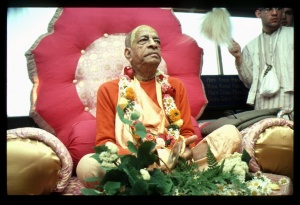SB 6.12.27-29: Difference between revisions
m (1 revision(s)) |
m (Text replacement - "==== <div class=" to "==== <div class=") |
||
| Line 1: | Line 1: | ||
{{info | {{info | ||
|speaker= | |speaker=Śukadeva Gosvāmī | ||
|listener=King | |listener=King Parīkṣit | ||
}} | }} | ||
[[Category:Srimad-Bhagavatam - Canto 06 Chapter 12]] | |||
[[Category:Bhagavatam Verses Spoken by Sukadeva Gosvami - Vanisource|061227]] | |||
<div style="float:left">'''[[Srimad-Bhagavatam]] - [[SB 6|Sixth Canto]] - [[SB 6.12: Vrtrasura's Glorious Death|Chapter 12: Vṛtrāsura's Glorious Death]]'''</div> | |||
<div style="float:right">[[File:Go-previous.png|link=SB 6.12.26]] '''[[SB 6.12.26]] - [[SB 6.12.30]]''' [[File:Go-next.png|link=SB 6.12.30]]</div> | |||
{{RandomImage}} | |||
==== TEXTS 27-29 ==== | ==== TEXTS 27-29 ==== | ||
<div class="verse"> | |||
:mahā-prāṇo mahā-vīryo | |||
:mahā-sarpa iva dvipam | |||
:kṛtvādharāṁ hanuṁ bhūmau | |||
:daityo divy uttarāṁ hanum | |||
:nabho-gambhīra-vaktreṇa | |||
:leliholbaṇa-jihvayā | |||
:daṁṣṭrābhiḥ kāla-kalpābhir | |||
:grasann iva jagat-trayam | |||
:atimātra-mahā-kāya | |||
:ākṣipaṁs tarasā girīn | |||
:giri-rāṭ pāda-cārīva | |||
:padbhyāṁ nirjarayan mahīm | |||
:jagrāsa sa samāsādya | |||
:vajriṇaṁ saha-vāhanam | |||
giri-rāṭ pāda-cārīva | |||
padbhyāṁ nirjarayan mahīm | |||
jagrāsa sa samāsādya | |||
vajriṇaṁ saha-vāhanam | |||
</div> | </div> | ||
| Line 27: | Line 34: | ||
==== SYNONYMS ==== | ==== SYNONYMS ==== | ||
<div class="synonyms"> | |||
<div | ''mahā-prāṇaḥ''—very great in bodily strength; ''mahā-vīryaḥ''—showing uncommon prowess; ''mahā-sarpaḥ''—the biggest snake; ''iva''—like; ''dvipam''—an elephant; ''kṛtvā''—placing; ''adharām''—the lower; ''hanum''—jaw; ''bhūmau''—on the ground; ''daityaḥ''—the demon; ''divi''—in the sky; ''uttarām hanum''—the upper jaw; ''nabhaḥ''—like the sky; ''gambhīra''—deep; ''vaktreṇa''—with his mouth; ''leliha''—like a snake; ''ulbaṇa''—fearful; ''jihvayā''—with a tongue; ''daṁṣṭrābhiḥ''—with teeth; ''kāla-kalpābhiḥ''—exactly like the time factor, or death; ''grasan''—devouring; ''iva''—as if; ''jagat-trayam''—the three worlds; ''ati-mātra''—very high; ''mahā-kāyaḥ''—whose great body; ''ākṣipan''—shaking; ''tarasā''—with great force; ''girīn''—the mountains; ''giri-rāṭ''—the Himalaya Mountains; ''pāda-cārī''—moving on foot; ''iva''—as if; ''padbhyām''—by his feet; ''nirjarayan''—crushing; ''mahīm''—the surface of the world; ''jagrāsa''—swallowed; ''saḥ''—he; ''samāsādya''—reaching; ''vajriṇam''—Indra, who carries the thunderbolt; ''saha-vāhanam''—with his carrier, the elephant. | ||
mahā- | |||
</div> | </div> | ||
| Line 35: | Line 41: | ||
==== TRANSLATION ==== | ==== TRANSLATION ==== | ||
<div class="translation"> | |||
<div | |||
Vṛtrāsura was very powerful in physical strength and influence. He placed his lower jaw on the ground and his upper jaw in the sky. His mouth became very deep, like the sky itself, and his tongue resembled a large serpent. With his fearful, deathlike teeth, he seemed to be trying to devour the entire universe. Thus assuming a gigantic body, the great demon Vṛtrāsura shook even the mountains and began crushing the surface of the earth with his legs, as if he were the Himalayas walking about. He came before Indra and swallowed him and Airāvata, his carrier, just as a big python might swallow an elephant. | Vṛtrāsura was very powerful in physical strength and influence. He placed his lower jaw on the ground and his upper jaw in the sky. His mouth became very deep, like the sky itself, and his tongue resembled a large serpent. With his fearful, deathlike teeth, he seemed to be trying to devour the entire universe. Thus assuming a gigantic body, the great demon Vṛtrāsura shook even the mountains and began crushing the surface of the earth with his legs, as if he were the Himalayas walking about. He came before Indra and swallowed him and Airāvata, his carrier, just as a big python might swallow an elephant. | ||
</div> | </div> | ||
__NOTOC__ | |||
<div style="float:right; clear:both;">[[File:Go-previous.png|link=SB 6.12.26]] '''[[SB 6.12.26]] - [[SB 6.12.30]]''' [[File:Go-next.png|link=SB 6.12.30]]</div> | |||
__NOTOC__ | |||
__NOEDITSECTION__ | |||
Revision as of 15:35, 14 November 2018

A.C. Bhaktivedanta Swami Prabhupada
TEXTS 27-29
- mahā-prāṇo mahā-vīryo
- mahā-sarpa iva dvipam
- kṛtvādharāṁ hanuṁ bhūmau
- daityo divy uttarāṁ hanum
- nabho-gambhīra-vaktreṇa
- leliholbaṇa-jihvayā
- daṁṣṭrābhiḥ kāla-kalpābhir
- grasann iva jagat-trayam
- atimātra-mahā-kāya
- ākṣipaṁs tarasā girīn
- giri-rāṭ pāda-cārīva
- padbhyāṁ nirjarayan mahīm
- jagrāsa sa samāsādya
- vajriṇaṁ saha-vāhanam
SYNONYMS
mahā-prāṇaḥ—very great in bodily strength; mahā-vīryaḥ—showing uncommon prowess; mahā-sarpaḥ—the biggest snake; iva—like; dvipam—an elephant; kṛtvā—placing; adharām—the lower; hanum—jaw; bhūmau—on the ground; daityaḥ—the demon; divi—in the sky; uttarām hanum—the upper jaw; nabhaḥ—like the sky; gambhīra—deep; vaktreṇa—with his mouth; leliha—like a snake; ulbaṇa—fearful; jihvayā—with a tongue; daṁṣṭrābhiḥ—with teeth; kāla-kalpābhiḥ—exactly like the time factor, or death; grasan—devouring; iva—as if; jagat-trayam—the three worlds; ati-mātra—very high; mahā-kāyaḥ—whose great body; ākṣipan—shaking; tarasā—with great force; girīn—the mountains; giri-rāṭ—the Himalaya Mountains; pāda-cārī—moving on foot; iva—as if; padbhyām—by his feet; nirjarayan—crushing; mahīm—the surface of the world; jagrāsa—swallowed; saḥ—he; samāsādya—reaching; vajriṇam—Indra, who carries the thunderbolt; saha-vāhanam—with his carrier, the elephant.
TRANSLATION
Vṛtrāsura was very powerful in physical strength and influence. He placed his lower jaw on the ground and his upper jaw in the sky. His mouth became very deep, like the sky itself, and his tongue resembled a large serpent. With his fearful, deathlike teeth, he seemed to be trying to devour the entire universe. Thus assuming a gigantic body, the great demon Vṛtrāsura shook even the mountains and began crushing the surface of the earth with his legs, as if he were the Himalayas walking about. He came before Indra and swallowed him and Airāvata, his carrier, just as a big python might swallow an elephant.